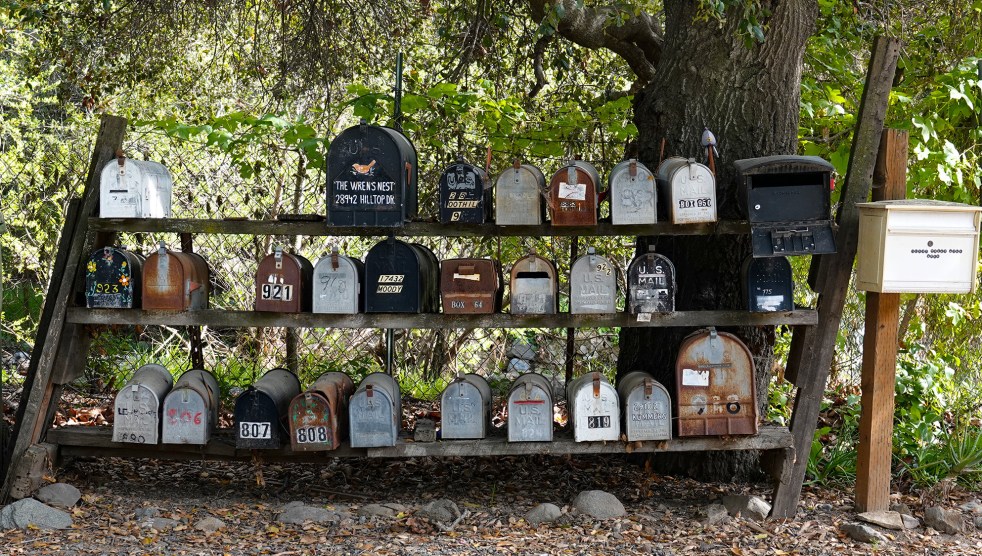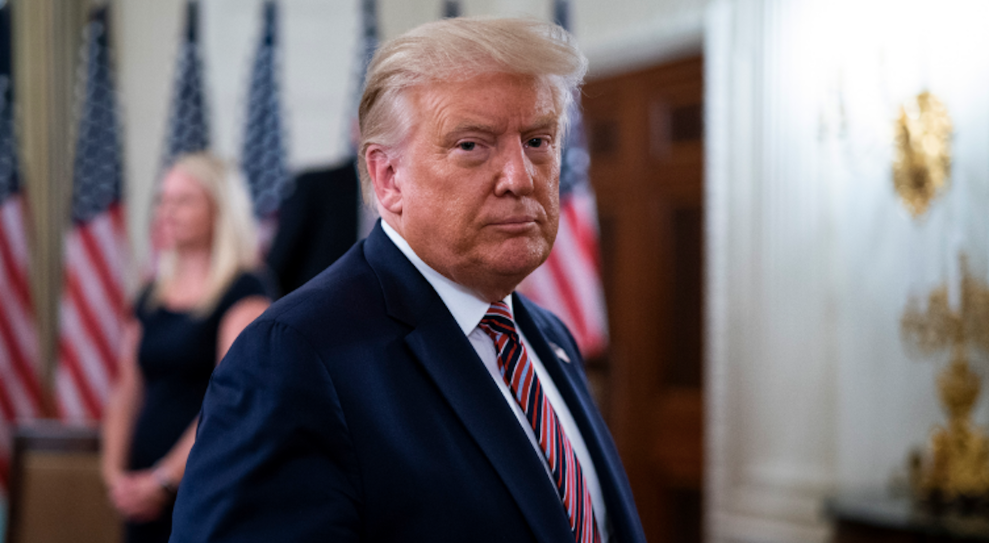
A mail truck moves down a street Tuesday, Aug. 18, 2020, in Fox Point, Wis. Facing public pressure and state lawsuits, the Postmaster general announced Tuesday he is halting some operational changes to mail delivery that critics warned were causing widespread delays and could disrupt voting in the November election. (AP Photo/Morry Gash)
It’s a story ripped straight from the headlines: A millionaire with no experience in mail delivery and a complex web of personal business interests is appointed postmaster general by the popular-vote-losing Republican president he gave $200,000 to help elect. Liberal critics of the president, such as the Nation, cry foul. It is corruption, plain and simple.
The president was Benjamin Harrison. What, you thought I was talking about someone else?
As Devin Leonard explains in his lively history of the post office, Neither Snow Nor Rain: A History of the United States Postal Service, John Wanamaker was a department-store magnate and an easy target: a Gilded Age campaign donor placed in charge of one of the nation’s most storied institutions. What could go wrong? But instead of chopping away at the post office, Wanamaker tried to revamp it. He pitched ahead-of-his time ideas like free rural delivery, parcel shipping, and postal banking. This was 1889, not 2020—even the businessmen thought the post office should be more than a business.
Flash forward to today, though, and the story has been inverted. Three months after being appointed postmaster general, Louis DeJoy, a Republican logistics CEO who gave $1.2 million to President Donald Trump’s victory fund, has taken a hatchet to United States Postal Service. Citizens (including veterans) can’t get their medication or pay their bills on time. Meanwhile, the president has vowed to starve the Postal Service of needed emergency funds in order to inhibit its ability to handle absentee ballots.
“We’ve never had a sitting president that’s attacked the Postal Service or the post office like this,” North Carolina A&T State University history professor Philip Rubio told me. Rubio, a former postal worker, is the author of two books about the post office. His most recent, Undelivered: From the Great Postal Strike of 1970 to the Manufactured Crisis of the U.S. Postal Service, was published in June, just as the crisis entered its latest stage.
“This is an historic crisis, and it’s an entirely political one,” he said. “It’s ironic when you think about it—when Nixon signed the Postal Reorganization Act 50 years ago, he said for once and for all we can take politics out of the post office,” Rubio said. “But you just can’t do that. The post office has always been political—not just a political football, but in the past it was one of the coaches. Now it’s more of a football.”
Understanding the ways in which the post office was politicized then helps crystallize what’s different about today. As Rubio explains, for the first two centuries of its existence, the United States Post Office was a cabinet-level department, and the postmaster general was a key cog in partisan political operations. “It was a rare postmaster general who actually had any post office experience,” Rubio said. “They were oftentimes campaign managers, they were political appointees, they were political allies, donors.” They were, in other words, a lot like Louis DeJoy.
Franklin D. Roosevelt’s first postmaster general, James Farley, served simultaneously as chairman of the Democratic National Committee. He’d previously been FDR’s campaign manager and later tried to run for president himself. Lyndon Johnson’s postmaster general, Larry O’Brien, became chairman of the DNC just a few months after leaving his post. (If the name sounds familiar, it’s because he later became commissioner of the NBA; the championship trophy is named for him.)
In the 19th century, before the civil-service reforms that followed the assassination of President James Garfield by a patronage seeker, post office jobs were doled out as political favors. And those workers were often expected to get out the vote for the party in power. Leonard writes that the department even employed “special agents” who “spied on postmasters to make sure they encouraged customers to vote for the political party in power with sufficient zeal.”
The post office was meant to facilitate politics. Lawmakers viewed it as a necessary cog in the growth of democratic institutions, connecting people and ideas in the form of correspondence and newspapers—which in those days, were fiercely partisan. As the USPS notes on its site, the local newspaper publisher and the local postmaster were often the same person.
The post office was a tool for not just electioneering but the handling of elections themselves. “In the Civil War we actually had an election—something that you just don’t see anywhere else in history,” Rubio said. And “150,000 Union army troops were able to vote. They didn’t come home. For the most part, they voted in the field. They were voting absentee or they voted by proxy.” (The war led to another innovation—for the first time, the post office began home delivery in select cities.)
The history of the Postal Service is a series of political choices and fights. Congress’ decision to let the private sector run the telegraph (which, Rubio noted, was originally developed with the post office in mind) was a political choice. Rural free delivery was a political choice—a controversial and expensive response, Leonard noted in his book, to ascendant populist trends at the turn of the century. President William Howard Taft’s decision to introduce postal banking a few years later, and to allow the post office to deliver packages, were political choices, driven by a belief that the department could and should take on a far greater role than carrying letters. The post office was also an enforcement mechanism for political norms, helping to suppress anti-slavery tracts before the Civil War and materials considered politically radical or sexually explicit for decades after it.
But while the personnel and the policies changed, the belief in the post office as a public entity rather than a business was a constant. “It was always fundamentally about service,” Rubio said. “There have always been business aspects to it, it’d be silly to deny that… But for years it was selling postage but it was also asking for subsidies. It wasn’t demanding some kind of handouts because it couldn’t balance its books or run itself efficiently like a business. Consider the banks, railroads, and corporations of the 19th century that ran themselves into the ground with or without government subsidies. Those subsidies were there for a reason—they were going to help develop sectors of the American economy and population: advertising, publishing, rural populations, things like that.”
In other words, the idea that the post office should be operated like a business, cutting costs and services to maximize its profits is an entirely modern one. The first big shift came with the reorganization of 1970. President Nixon was pushing to incorporate the post office as a semi-autonomous and self-sufficient, much like the Tennessee Valley Authority or FDIC; a presidential commission comprised largely of CEOs believed it should cut costs and run itself more like a private-sector enterprise. But postal workers, who had gone without raises for years amid often hostile working conditions, were opposed. When Nixon’s plan picked up steam, workers in New York City launched a wildcat strike, soon followed by postal unions in other cities. The nation’s mail service ground to halt. Desperate, Nixon called in the National Guard to sort and deliver mail.
The postal workers made their point. In the end, Nixon signed a compromise into law. The United States Post Office became the United States Postal Service. The postmaster general was removed from the cabinet and was no longer appointed by the president; instead, they’d be chosen by a board of governors selected by the president. Nixon would get his wish—the USPS would operate semi-independently—but the unions would also get something out of it too; workers got new pay raises and the right to collectively bargain.
This created the USPS as we know it today, an “unholy compromise,” in Rubio’s words, tasked with the “internal conundrum” of providing universal services while also largely paying for itself. Things didn’t dramatically change at first—even then, the idea of the post office as a public good endured. “The 1970 crisis was certainly a crisis at the post office but it was never an existential crisis,” Rubio says. “Nobody questioned the need of the post office. If anything it reaffirmed how important the post office was for American life.”
Also significant was what wasn’t in the law: much of the language used by conservatives today to minimize the agency. Trump himself maligns it as “money-losing.” “Just look through it and type in words like ‘business,’ ‘corporation,’ ‘self-supporting,’” Rubio said. “Nothing like that turns up.” Instead, the text called for the agency to be “operated as a basic and fundamental service to bind the nation together,” and stated that costs should not “impair” the agency’s commitment to providing such service. “There’s like eight or nine elements here that read like the preamble to the Constitution or the Declaration of Independence.”
But in the decades that followed the postal reorganization, the rhetoric around USPS shifted. Once the post office was detached from the rest of the government, it was easier to chip away at its revenue stream and cut off supplemental funds. Private delivery services such as FedEx and UPS mounted Washington lobbying efforts to curtail USPS’ mission, and the ascendant conservative movement, which sought to privatize all manner of government functions and (very selectively) obsessed over making programs revenue-neutral, set its sights on the service.
Finally, in 2006, Congress passed the Postal Accountability and Enhancement Act, which as defenders of the USPS have noted ever since, saddled the agency with pre-funding its retirement benefits to the tune of $5.5 billion a year for 10 years. At the same time, the law barred the post office from expanding its range of services (as it had in the past) beyond mail and parcel delivery, satisfying private-sector interests that feared a government-backed competitor moving into their space. (So much for postal e-mail.) So USPS would have to be run like business, except with none of the freedom to innovate or balance its own books. The funding mandate, which took effect shortly before the Great Recession, put the USPS in a financial hole it has never gotten out of.
On Tuesday, DeJoy announced that he was suspending his overhaul of the Postal Service until after the election. Prompt delivery of ballots, he said, would be his “number one priority.” But by then, Congress had gotten involved. The Senate will hold hearings on Friday; the House will grill DeJoy on Monday. Even President Trump, reading the room for once, offered a cryptic suggestion of support:
SAVE THE POST OFFICE!
— Donald J. Trump (@realDonaldTrump) August 17, 2020
Political fights about the Postal Service, according to Rubio, are part of the natural give and take of a democracy. “The post office should remain political, because it serves the needs of all Americans,” he argued. “For decades, even though there was contentiousness between the labor unions and management, it’s managed to survive, as long as the two major political parties agreed that, even if it was political, it should not be partisan. Now it’s become a partisan weapon.”
















